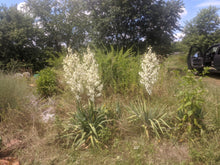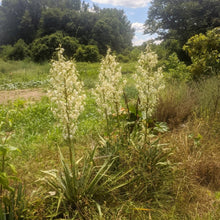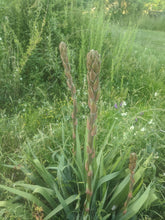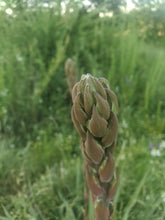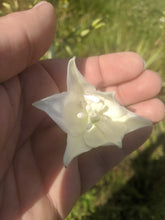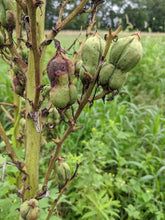'Northern' Yucca
Regular price
$4.00
Sale
Yucca filamentosa
Origin: New Jersey & Massachusetts
Improvement status: Landrace
Seeds per packet: ~25
Germination tested 11/2024: 50%
Life cycle: Perennial
Native to coastal areas of the US Southeast, Yucca, or "Adam's Needle," has become naturalized across much of eastern North America. These seeds come from plants growing at the EFN flagship farm in Elmer, NJ, along with some foraged from a naturalized population in Massachusetts. A member of the Asparagus family (Asparagaceae), yucca's stalk, flowers, and fruit are all edible — and its root is used to make soap. The flowers and flower buds can be pickled or brined, with a result that tastes much like olives. The emerging flowering stalk resembles a giant asparagus spear (see photo), but unlike asparagus you probably will not enjoy it raw (unless you like the taste of soap). Cooking breaks down the saponins that give raw yucca its soapy flavor and ability to make soap. Yucca leaf fiber is useful for making cordage and basket weaving. Dried yucca fiber can be used as tinder for starting fires. (And just to clear up any confusion: this is a different plant from "yuca", which is the common Spanish name used for the edible root of the unrelated cassava plant.)
One of the most amazing things about yucca is the "obligate mutualism" relationship it has with multiple species of small white moths (including Tegeticula yuccasella). They are the only pollinator of the yucca, and it is the only plant in which they lay their eggs. These "true yucca moths" evolved along with the yucca, and so did species called "bogus yucca moths," which for some reason look just like the true yucca moths, but don't do any pollinating!
The males and females mate at night, when the newest flowers open. The yucca moth lives as an adult for only around four days, a lifetime so short that they don't eat — they even lack sucking mouthparts as other moths have. But the female has specialized tentacle-like protrusions around her head which she uses to gather pollen from one flower, which she then tucks under her chin in a ball before flying into another flower (usually on another plant). She lays her egg in the ovary (which will develop into a fruit), and places the pollen ball directly on the stigma of the flower. The larvae soon hatch and feed on the developing seeds inside the fruit — but not all of them, of course (or else the plant would go extinct!). The larvae eventually drop to the ground (ideally after a nighttime rainstorm), where they burrow and pupate — some for up to four years. They don't all hatch the next year, in case their yucca partner fails to flower.
Yuccas are beautiful specimen plants for any landscape. This species is said to be cold hardy down to Zone 4, but it will probably do better in a protected spot in such a cold area. It stays green all winter, but the real show is in early summer when it explodes in a gorgeous display of white flowers.
GROWING TIPS: For germination, temperatures should be between 60 and 70 degrees Fahrenheit (15-21 C). They prefer well-drained soil with plenty of grit added. We recommend starting yucca seeds indoors and keeping in containers until they read a good size. Germination may be quite variable, but some should sprout for you (we got a 30% germination rate in a germination chamber designed for standard vegetable seeds, so we assume these seeds will have a higher germination rate in gritty soil or seed starting mix). Plant in full sun for best floral displays, and keep well weeded while plant is still sizing up.







